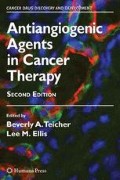Summary
Although there are innumerable examples of studies demonstrating the efficacy of antiangiogenic therapy in preclinical models, unfortunatly the frequency and magnitude of this effect has been difficult to translate into the clinic. At the current time, with the exception of anti-VEGF therapy for renal cell carcinoma, single agent anti-angiogenic therapy has not lived up to expectations. At this stage is it important to critically evaluate potential explanations for why the success observed in preclinical studies has not translated into patient benifit. This chapter will focus on the biologic and human issues that have led to this apparent discrepancy.
Access this chapter
Tax calculation will be finalised at checkout
Purchases are for personal use only
Preview
Unable to display preview. Download preview PDF.
References
Jaffe, C. C. Measures of response: RECIST, WHO, and new alternatives. J Clin Oncol, 24: 3245–3251, 2006.
Bergers, G., Javaherian, K., Lo, K. M., Folkman, J., and Hanahan, D. Effects of angiogenesis inhibitors on multistage carcinogenesis in mice. Science, 284: 808–812, 1999.
Kuroishi, T., Tominaga, S., Morimoto, T., Tashiro, H., Itoh, S., Watanabe, H., Fukuda, M., Ota, J., Horino, T., and Ishida, T. Tumor growth rate and prognosis of breast cancer mainly detected by mass screening. Jpn J Cancer Res, 81: 454–462, 1990.
Eberhard, A., Kahlert, S., Goede, V., Hemmerlein, B., Plate, K. H., and Augustin, H. G. Heterogeneity of angiogenesis and blood vessel maturation in human tumors: implications for antiangiogenic tumor therapies. Cancer Res, 60: 1388–1393, 2000.
Benjamin, L. E., Golijanin, D., Itin, A., Pode, D., and Keshet, E. Selective ablation of immature blood vessels in established human tumors follows vascular endothelial growth factor withdrawal. J Clin Invest, 103: 159–165, 1999.
Reinmuth, N., Liu, W., Jung, Y. D., Ahmad, S. A., Shaheen, R. M., Fan, F., Bucana, C. D., McMahon, G., Gallick, G. E., and Ellis, L. M. Induction of VEGF in perivascular cells defines a potential paracrine mechanism for endothelial cell survival. FASEB J, 15: 1239–1241, 2001.
Ellis, L. M. Antiangiogenic therapy at a crossroads: clinical trial results and future directions. J Clin Oncol, 21: 281s–283s, 2003.
Bergers, G., Song, S., Meyer-Morse, N., Bergsland, E., and Hanahan, D. Benefits of targeting both pericytes and endothelial cells in the tumor vasculature with kinase inhibitors.[see comment]. J Clin Invest, 111: 1287–1295, 2003.
Shaheen, R. M., Tseng, W. W., Davis, D. W., Liu, W., Reinmuth, N., Vellagas, R., Wieczorek, A. A., Ogura, Y., McConkey, D. J., Drazan, K. E., Bucana, C. D., McMahon, G., and Ellis, L. M. Tyrosine kinase inhibition of multiple angiogenic growth factor receptors improves survival in mice bearing colon cancer liver metastases by inhibition of endothelial cell survival mechanisms. Cancer Res, 61: 1464–1468, 2001.
Ribatti, D., Nico, B., Vacca, A., Roncali, L., and Dammacco, F. Endothelial cell heterogeneity and organ specificity. J Hematother Stem Cell Res, 11: 81–90, 2002.
Rajotte, D., Arap, W., Hagedorn, M., Koivunen, E., Pasqualini, R., and Ruoslahti, E. Molecular heterogeneity of the vascular endothelium revealed by in vivo phage display. J Clin Invest, 102: 430–437, 1998.
Fidler, I. J. Angiogenic heterogeneity: regulation of neoplastic angiogenesis by the organ microenvironment.[comment]. J Natl Cancer Inst, 93: 1040–1041, 2001.
Zondor, S. D. and Medina, P. J. Bevacizumab: an angiogenesis inhibitor with efficacy in colorectal and other malignancies. Ann Pharmacother, 38: 1258–1264, 2004.
Ye, C., Sweeny, D., Sukbuntherng, J., Zhang, Q., Tan, W., Wong, S., Madan, A., Ogilvie, B., Parkinson, A., and Antonian, L. Distribution, metabolism, and excretion of the anti-angiogenic compound SU5416. Toxicol In Vitro, 20: 154–162, 2006.
Cobleigh, M. A., Langmuir, V. K., Sledge, G. W., Miller, K. D., Haney, L., Novotny, W. F., Reimann, J. D., and Vassel, A. A phase I/II dose-escalation trial of bevacizumab in previously treated metastatic breast cancer. Semin Oncol, 30: 117–124, 2003.
Editor information
Editors and Affiliations
Rights and permissions
Copyright information
© 2008 Humana Press
About this chapter
Cite this chapter
Ellis, L.M. et al. (2008). Challenges in Translating Antiangiogenic Therapy from the Bench to Bedside. In: Teicher, B.A., Ellis, L.M. (eds) Antiangiogenic Agents in Cancer Therapy. Cancer Drug Discovery and Development. Humana Press. https://doi.org/10.1007/978-1-59745-184-0_19
Download citation
DOI: https://doi.org/10.1007/978-1-59745-184-0_19
Publisher Name: Humana Press
Print ISBN: 978-1-58829-870-6
Online ISBN: 978-1-59745-184-0
eBook Packages: MedicineMedicine (R0)

